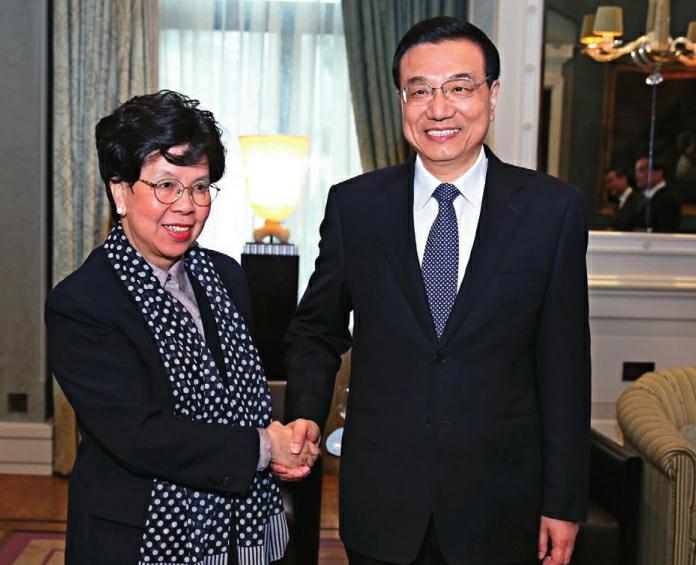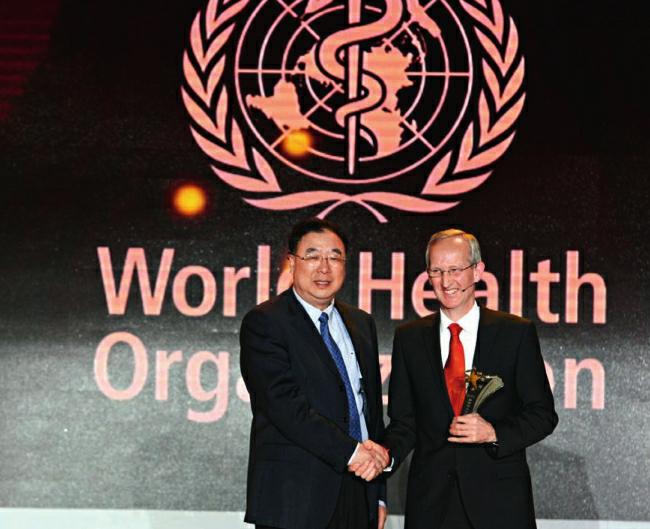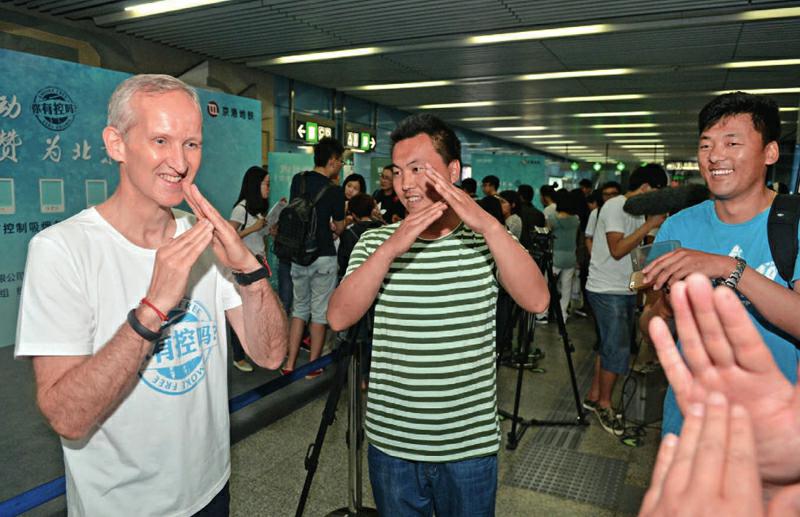China and WHO:Strengthened Cooperation and Shared Experience
By+staff+reporter+DANG+XIAOFEI
BEIJING recently adopted a tough new tobacco control law. Since June 1, 2015 all indoor public places – and many outdoor public places – in Beijing are required to be 100 percent smoke-free. The World Health Organization (WHO) has positively participated in the process of advocating and promoting the new law, the strongest tobacco control legislation enforced in China to date. It initiated a tobacco control campaign entitled #RUFREE in May in Beijings subway network, including posters featuring several high profile Chinese celebrities voicing their support for stronger tobacco control policies.
Apart from raising public awareness of the dangers of tobacco, WHO has strongly supported the introduction of new restrictions on tobacco advertising contained in Chinas revised Advertising Law, aiming to ban all forms of tobacco advertising, promotion, and sponsorship.
“We are working very closely with our counterparts to make sure not only that the problems are recognized, but also that China lives up to international tobacco control conventions,” said Dr. Bernhard Schwartl?nder, WHO Representative in China. “This is typically how we work with the Chinese government, and the anti-smoking campaign has been very successful for both sides,” he concluded.
This is only one cooperation example between WHO and China. In fact, WHO has maintained a longstanding cooperation with China in many aspects.
For the Health of Humankind
Traditional Chinese medicine has thousands of years of history. “I think it would be very arrogant to ignore that fact, simply because Western medicine is so much simpler to understand,” said Dr. Schwartl?nder. WHO emphasizes that traditional medicine can play an important role in achieving the goal of“Health for All” and has strengthened its cooperation with China in traditional Chinese medicine over the years.
“The wisdom of traditional Chinese medicine principles is valuable. In many ways, Western medicine and traditional medicine can be synergetic, which is exactly what we are trying to make sure we understand: how those synergies can actually be implemented, and how the two types of medicine can be used together,”Dr. Schwartl?nder said.
He also pointed out that both sides have to improve and strengthen the ef-fectiveness and regulation of prescribed medicine.
WHO is just the platform for the dialogues between East and West. “The best people from China come together with the best people in the world, so they can exchange knowledge and develop joint strategies,” Schwartl?nder said.endprint
Besides, there are many other areas such as non-communicable diseases and chronic diseases where Dr. Schwartl?nder thinks cooperation is very important. Take hepatitis for example. Over the last 25 years, China has achieved remarkable progress with its hepatitis B vaccination program. New data show that less than 1 percent of under 15-year-olds in China are infected with hepatitis B, 90 percent less than in the pre-vaccination era.
But more needs to be done to improve treatment of hepatitis in China. Of the approximately 100 million adults living with hepatitis B or C in China, tens of millions urgently need treatment but cannot access it. WHO is working closely with the Chinese government to improve access to treatment for these sufferers.
“Investing in a public health approach to hepatitis treatment – that is, making treatment available to all who need it through a public subsidy scheme on an equitable basis – will result in fewer deaths, and the saving of significant costs for both society and the government,” Dr. Schwartl?nder said.
The cooperation between WHO and China has extended to international medical affairs. When Ebola broke out in 2014, China responded quickly and was among the first countries to join the global fight to give support to WHO.
More than US $120 million was channeled to help countries struck by the epidemic. “The best experts in China travelled and lived in Africa. They sacrificed their time and family life to go there to help fight the diseases,” Dr. Schwartl?nder said.
Help through Health Reform
Over the last five years, China has undertaken the biggest health reform in history – with remarkable results: 95 percent of Chinas 1.39 billion citizens now have access to a basic health insurance package, up from 30 percent in 2003.
Yet, challenges still remain. “To create a new health system, the health reform that is going on right now in a country like China has a huge task ahead. It is likely to be the largest health reform that the world has ever seen,” Dr. Schwartl?nder said. For China, to build a strong, sustainable, equitable, and cost-effective health system equipped to meet current and future challenges, further reforms are needed.
At the request of senior government officials, the World Bank and WHO are collaborating with Chinas Ministry of Finance, National Health and Family Planning Commission (NHFPC), and Ministry of Human Resources and Social Security to analyze current constraints within the health reform process and identify practical solutions.endprint
“We are working closely with our Chinese counterparts to ease them into the ‘deep water phase of the health reform,” Schwartl?nder said. “This is not something that will see quick wins every day. But again, given the sheer size of China, there are obstacles we must carefully consider as regards working with our counterparts. This also applies to how we work with our government partners.”
Dr. Schwartl?nder went on to explain one of the problems – that the Chinese health system hasnt kept pace with modern methodology in some areas. For example, hepatitis is a chronic disease that had no effective treatment until a few years ago. Now, a good treatment is available but the Chinese system cant embrace it because its too expensive and complicated, Dr. Schwartl?nder said.
“That is something we try to work out with our colleagues. We try to help them work with Chinese authorities and pharmaceutical companies to make the price more affordable. Chinese people may then benefit from therapies that exist in other countries but have not made it to China,” he added.
The World Bank-WHO collaboration with Chinas Ministry of Finance, NHFPC, and Ministry of Human Resources and Social Security will deliver recommendations to the government later this year on the practical and concrete actions required to build a healthcare system for the future.
Food Safety a Top Priority
From farm to plate, food safety is everyones responsibility – that was the theme of the WHO World Health Day this year. In China, the government continued to lead with the 12th Five-year Plan listing food safety as a critical, national task.
“Safe food is a fundamental: people want, and need, to know that every bite of food they take is safe to eat. When Premier Li Keqiang told the State Council that food was essential and safety should be a top priority, it was recognized that China needed to focus on the problems posed by unsafe food,” Dr. Schwartl?nder said.
World Health Day is celebrated every April 7 to highlight a priority area of concern for the World Health Organization. In 2015, the focus of World Health Day was food safety.
In China, WHO used World Health Day to promote food safety awareness amongst all sectors of the food production chain. According to a 2011 study, more than 94 million people become ill from bacterial food-borne diseases in China every year – with approximately 3.4 million hospitalizations and more than 8,500 deaths.
The “From Farm to Plate” campaign showcases the steps each party can take to reduce the incidence of food-borne illness.
“We are working with the Chinese authorities, in particular the Food and Drug Administration, to make sure that China produce meets the highest quality standards. It can then enter the international market and benefit those who really need it,” Dr. Schwartl?nder said.endprint

